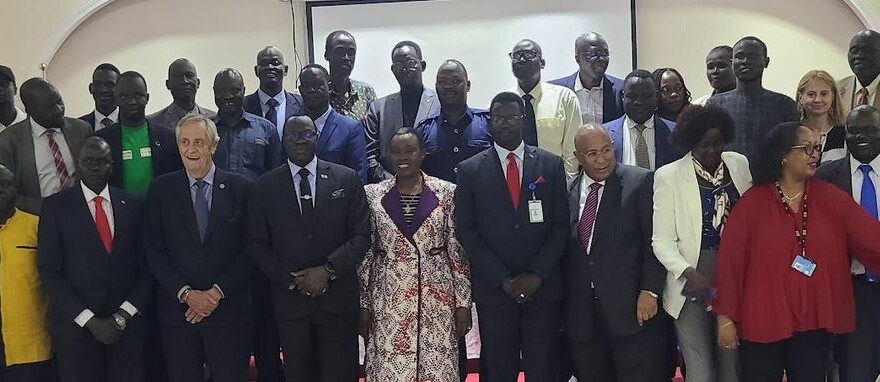The Strategic Defense and Security Review Board (SDSR-B) on Thursday concluded a five-day workshop that completed the validation process of the five long-awaited security reform documents.
The documents are namely; Strategic Security Assessment, Security Policy Framework, Revised Defense Policy, Transformation Roadmap, and the White Paper on Defense and Security.
Speaking at a press conference in Juba on Thursday evening, Angelina Teny, the Minister of Interior and Chair of the Board, told journalists that the validation of the documents shows a great step in the country’s quest for security reforms.
“We called you today to inform all who are concerned, including the public, that the Board finally concluded the validation of the documents required by the Agreement,” she stated.
According to Teny, the five security reform documents will be delivered to the two principals, President Salva Kiir and First Vice President Dr. Riek Machar, for their approval and later to the Council of Ministers and the National Legislature.
She said there shall be a second validation process that will bring together stakeholders in a security sector conference that will be attended by the top leadership.
“The SDSR-B would like to assure the people of South Sudan of her commitment to security sector transformation that will finally bring lasting stability, peace, economic development, and prosperity to the people of South Sudan,” she affirmed.
According to Chapter II, article 2.5 of the revitalized peace agreement, the SDSR-B is entrusted to produce essential documents that shall provide the framework for security sector transformation.
The outputs as required by the Agreement are as follows: Strategic Security Assessment (SSA), Security Policy Framework (SPF), Revised Defense Policy (RDP), Security Sector Transformation (SST) Roadmap, and White Paper on Defense and Security. The findings of these documents are to be reflected in the White Paper on Defense and Security.
The transformation process has a set of reforms to be undertaken in the security sector which will gradually lead to the overall restructuring of the architecture of the security sector including future command and control of the Army and all other organized forces.
Teny said the procedural stages are outlined in the peace agreement’s Chapter II article 2.5.4 and divided into four stages and three phases. The first stage is the process of assessment to identify security challenges that affect the country currently and may affect it in the future and undermine security. In contrast, the second stage includes the analyses of the challenges and threats to arrive at the required capacity and capability to enable the security sector to respond effectively, efficiently, and promptly to internal and external challenges.
The third and fourth stages seek approval from the principles, the executive, and legislature and subsequently the implementation of the security sector reforms (SSR). The White Paper shall also guide the process of Demobilization, Disarmament, and Reintegration (DDR).
For his part, Gen. Chol Thon Balok, the Minister of Defense and Veteran Affairs who is also co-chair of the committee, said validation of the documents marks the end of the first stage of the security reform process.
“We gathered here to deliberate on defense and security sector reform as stipulated in the revitalized peace agreement. Article 2.5 empowered the SDSR Board to produce the following important documents on the defense and security sector,” he said. “Today, we have come to the end of the first two stages of the SDSR. Our next journey is to seek approval of the above strategic documents and policies from the president and his first vice president and the Council of Ministers and National Parliament.”
The defense minister however outlined several challenges that hindered the timely validation of the documents, ranging from lack of finance to the swapping of the ministers of defense and Interior.
He said the documents are going to be owned by the security sector.
“I would like to appreciate UNMISS and RJMEC for their tireless efforts for the peace in South Sudan in terms of funding,” Gen. Balok acknowledged. “I want to extend my appreciation to the organizers and partners for supporting this security sector reform for stability in South Sudan.”
Meanwhile, Nicholas Haysom, the Special Representative of the Secretary-General of the United Nations and head of UNMISS, commended the SDSR Board for the move, describing it as a milestone in the implementation of the peace agreement.
“The completion of these documents by the Strategic Defense and Security Sector Review Board lays an important foundation and platform for the long-term future of the security sector in South Sudan,” he commended. “I would like to take the opportunity to congratulate the Board its chair, co-chairs, members, and secretaries on the successful implementation of critical and progressive national documents that, for the first time, will establish South Sudan’s vision for its security sector. This is an important milestone, and I remember an equivalent milestone in my own country’s history” he commended.”
Haysom said UNMISS is honored to support the process and further reiterated support towards security reform in South Sudan.




